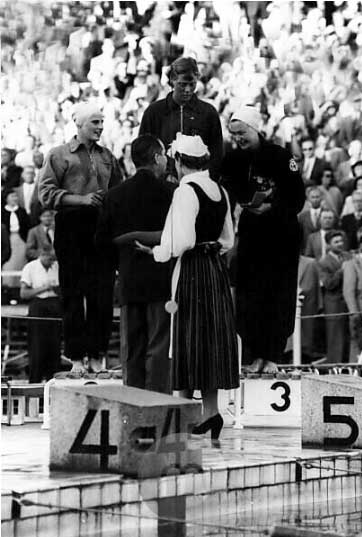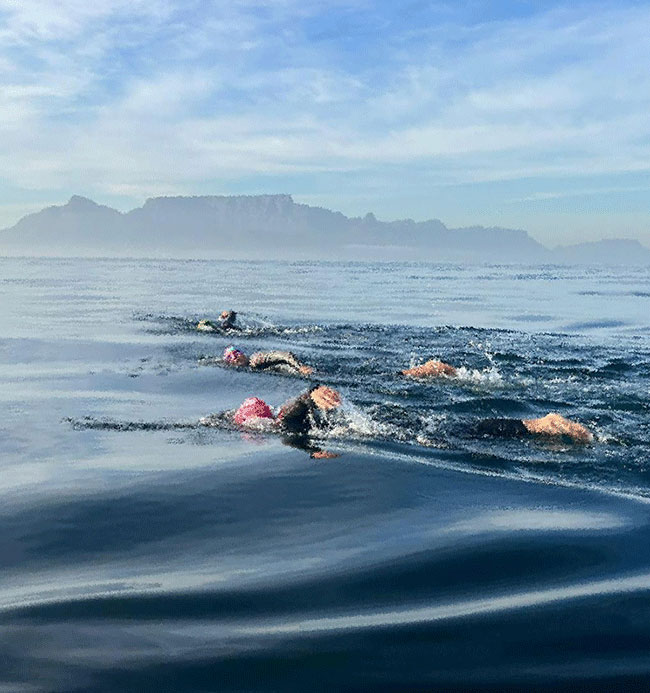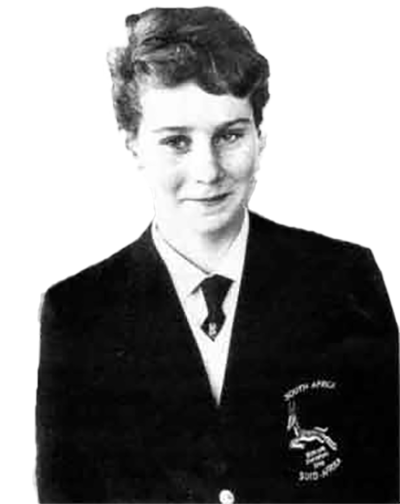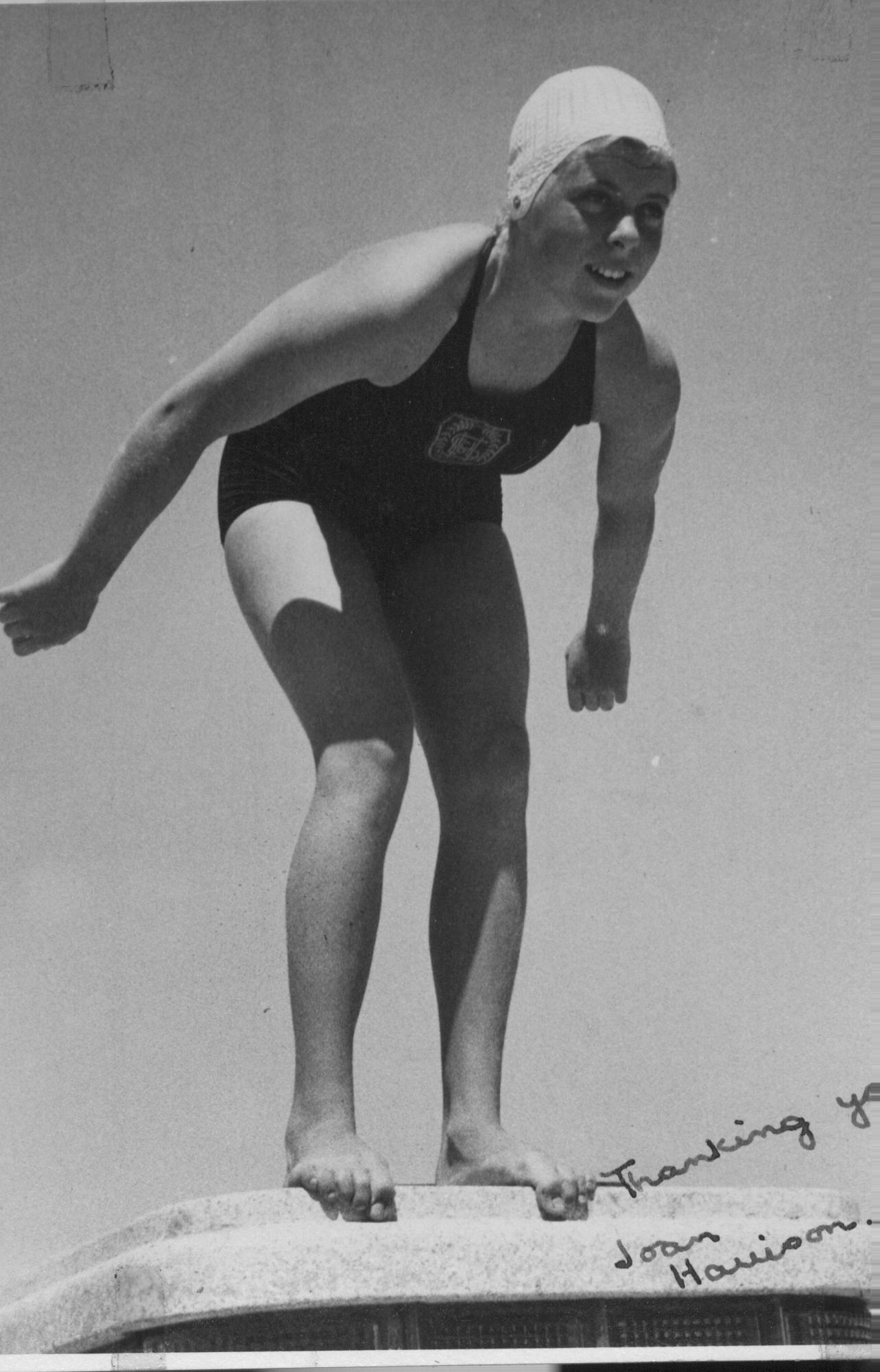Joan Harrison

Clarendon High School for Girls pupil in East London Joan Harrison was just 16 years old when she won a gold medal in the 100m backstroke at the 1952 Olympic Games in Helsinki. It would be another 44 years before another South African woman won a gold medal in the pool - Penny Heyns at Atlanta in 1996.
Joan had the following podium finishes at major championships: 1st in the 1952 Olympics 100 metres Backstroke; 1st in the 1950 British Empire Games 440 yards Freestyle, 1st in the 1954 British Empire and Commonwealth Games 110 yards Backstroke, 1st in the 1954 British Empire and Commonwealth Games 4×110 yards Freestyle (with Natalie Myburgh and the non-Olympians Felicity Loveday and Machduldt Petzer), 2nd in the 1954 British Empire and Commonwealth Games 3×110 yards Medley (with the non-Olympians Maggie Petzer and Mary Morgan), 3rd in the 1950 British Empire Games 110 yards Freestyle, 3rd in the 1954 British Empire and Commonwealth Games 110 yards Freestyle.
Please click here to see Joan's race in 1952.
Medallists for the Olympic women's 100m backstroke Joan Harrison, with Geertje Wielema (Neth) and Jean Stewart (NZ) at Helsinki in 1952.
Her victory in the 100-metre backstroke at Helsinki was a surprise to the whole swimming world, but not to her Manager, Alex Bulley. This excellent Swimming Manager was determined Joan could win this backstroke event and trained her accordingly in Helsinki. Although he had nothing to do with her coaching prior to Joan leaving for Finland, he took great pains to see that she trained assiduously whilst she was there. When the final race was on Alex Bulley was standing on one of the spectators' stands, and when Joan took the lead after the first turn Bulley, in his excitement, fell down the stand and "passed out". When the race was over and he found out that Joan had won the world title, he passed out again.
The swimming of our Springboks at these Games equalled any performance recorded by South African swimmers overseas and was due, to a great extent, to the training these young South Africans underwent prior to leaving the Union for the Games and also during their stay in Helsinki. At the 1954 Games in Vancouver, she won gold in 110yds in the backstroke; 4x110yds freestyle relay, silver in the 3x110yds medley relay, bronze in the 110yds freestyle.

Coach Bunny Clark with the Harrison family
For these achievements she was inducted into the International Swimming Hall of Fame in 1982.
Born in 1935 of a swimming mother and a rugby-playing father in East London, South Africa, Joan Harrison wasted little time taking advantage of her sporting heritage. At 13, she already held three Jr. and two Sr. national records, and that year won the 220 and 500 yd. Senior Freestyle National Championships.
In 1950, at age 14, she won the 440 yd. freestyle at the Commonwealth Games in Auckland, New Zealand, beating the old record by 13 seconds and finishing 7 seconds ahead of the field. It was her first international competition and she was declared the outstanding woman swimmer in the Games.
Her second International Games was the Helsinki Olympics in 1952, where she won South Africa's first and only Olympic gold medal for swimming. In 1954, at the Commonwealth Games in Vancouver, she won two gold medals, a silver, and a bronze before retiring at the ripe old age of 17.
She won the Helms Foundation Award for the best African athletic performance in any sport in 1952, and while concentrating on field hockey after 1954, she did manage to come back two more years to win the Nationals in her favourite 100-meter backstroke and in the 300 I. M. in 1956.
She was South Africa's supreme swimmer in freestyle, backstroke and I.M. for six years.

Olympic gold medallist Joan Breetzke, (nee Harrison) displays the gold medal she won at the Helsinki Olympics in 1952. The picture depicts her amazing welcome from thousands of East Londoners upon her return from Europe.
Sixty years ago East London swimmer Joan (Harrison) Breetzke, swam to a gold medal in the backstroke at the Helsinki Olympics. Speaking to the Daily Dispatch from her Selborne home Breetzke reminisced about the day her name went down in the history books. “I remember I had a busy week. Even on the day, there was a dilemma about doing the race because I did 400m freestyle in the morning. So I rested at lunchtime and did the 100m at 5 pm,” Breetzke said.
She said she went to the Olympics prepared to do her best, but never expected to win. Her Olympic winning time was 1:14.3 for the 100m backstroke. “I did not put too much pressure on myself. I was not the favourite, the girl from Holland [Geertje Wielema] was. Team South Africa was made up of more than 80 people and I was the only female swimmer.” The soft-spoken woman said she did not particularly enjoy the attention she was receiving, but she was grateful for all the support. “People made a fuss about it. But my life did not really change. I was still an ordinary girl from East London. When we arrived back in the city there were thousands of people waiting for me at the city hall.
I even drove down Oxford Street in an open-top car,” she said, adding that she lived life as normally as possible after that.


Oos Londen heldin onthou goud van 1952
Vier-en-veertig jaar gelede het tienduisende mense in die strate van Oos-Londen saamgedrom om een van Suid-Afrika se laaste Olimpiese gouemedalje-wenners 'n oorweldigende verwelkoming te gee. Gister het Joan Harrison Breetzke, wenner van die 100m-rugslag in 1952 in Helsinki, 'n telegram van gelukwense aan Penny Heyns, Suid-Afrika se eerste gouemedalje-wenner sedert Harrison Breetzke en Esther Brand dit laas verower het, in Atlanta gestuur.
``Baie geluk met jou wêreldrekord Welkom tot Goud Joan Harrison Breetzke (100m-rugslag in Helsinki 1952),'' het die boodskap gelui. Harrison Breetzke het gister aan Die Burger gesê: ``Ek is baie bly vir Penny se onthalwe dat sy 'n goue medalje verower het. Dit is 'n groot oomblik vir Suid-Afrika en ek weet baie goed hoe trots en emosioneel sy op die wenners- podium moes gevoel het. Ek onthou goed hoe emosioneel ek as 'n 16-jarige gevoel het.'' Sy sê sy onthou die oorweldigende blydskap van haar Suid-Afrikaanse spanmaats die meeste nadat sy die medalje verower het. ``Hulle het op my afgestorm, omhels en aanhoudend gelukgewens.''
Oorwinning 'nie maklik' Haar oorwinning was nie maklik nie. Die Saterdag vóór haar sege het sy meegeding in die 100 m-vryslag. Oor die eerste plek was daar geen twyfel nie, maar drie swemmers het omtrent gelyk klaargemaak in die tweede plek. Harrison Breetzke was een van hulle, maar die beoordelaars het haar vierde geplaas. Haar afrigter, Alex Bulley, oortuig daarvan dat sy van 'n tweede plek beroof is, het haar gemotiveer en meer vasberade gemaak vir die 100m-rugslag die volgende Donderdag.
Sy was nie die gunsteling nie, maar het van nêrens gekom en die Nederlander Geertje Wielema en die Nieu- Seelander Jean Stewart uitgestof om met die goue medalje weg te stap. Met haar terugkeer na Oos-Londen is sy soos 'n heldin terugverwelkom. Sy het in 'n afslaankap-motor deur die strate gery terwyl derduisende mense langs die strate gestaan het. Harrison Breetzke het in die somer en winter in die Quanza, 'n seewater swembad by Orient Strand in Oos- Londen, geoefen.
Wanneer sy in die winter saans by die huis gekom het, het haar ma haar in warm komberse toegedraai voordat sy in 'n warm bad gestop is. Die koue het in 1954 tot haar ont trekking uit die Statebond Spele gelei toe sy nie meer die koue water van die seeswembad kon hanteer nie. Harrison Breetzke is die ma van drie uitblinker seuns. Jon is 'n Springbok waterpolospe ler, Derek 'n junior Springbok in lewensredding en Brian het Suid-Afrikaanse kleure verwerf in lewensredding en 'n goue medalje verower op die onlangse lewensredding-wêreldkampioenskapsbyeenkoms.


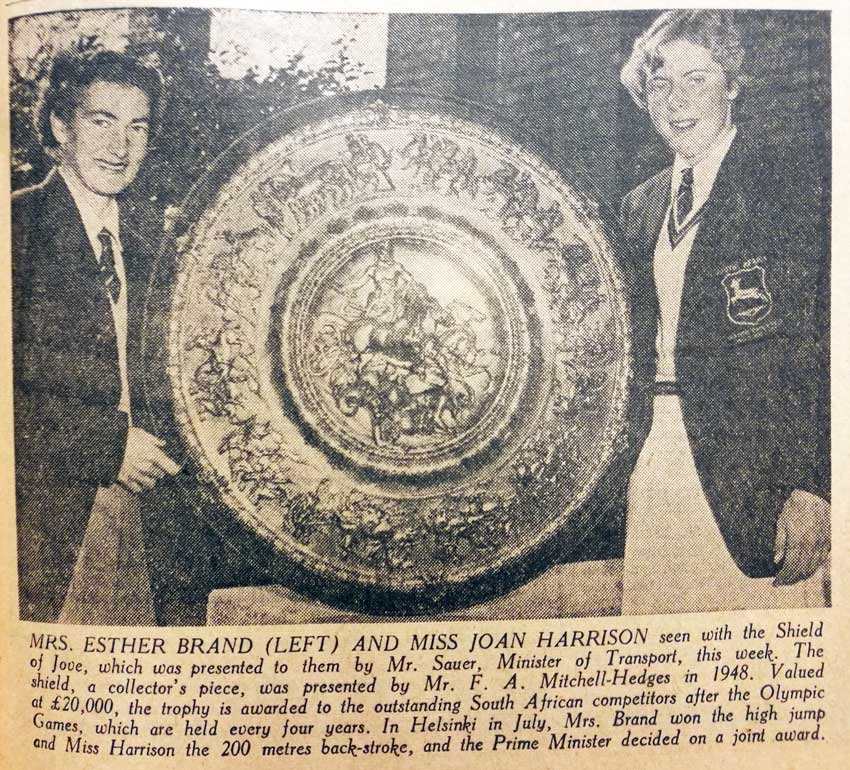
Joan Harrison, who won the back stroke swimming title in 1950 in New Zealand, when still a schoolgirl, did her training in her home town when her scholastic duties permitted her to do so. Her victory in the 100-metres backstroke at Helsinki was a surprise to the whole swimming world, but not to her Manager, Alex Bulley. This excellent Swimming Manager was determined Joan could win this backstroke event and trained her accordingly in Helsinki. Although he had nothing to do with her coaching prior to Joan leaving for Finland, he took great pains to see that she trained assiduously whilst she was there. When the final race was on Alex Bulley was standing on one of the spectators' stands, and when Joan took the lead after the first turn Bulley, in his excitement, fell down the stand and "passed out". When the race was over and he found out that Joan had won the world title, he passed out again.
The swimming of our Springboks at these Games equalled any performance recorded by South African swimmers overseas, and was due, to a great extent, to the training these young South Africans underwent prior to leaving the Union for the Games and also during their stay in Helsinki.

Joan congratulates Maggie Petzer for beating her at nationals in 1954 - with Felicity Loveday

Coach C.H. "Bunny" Clark poke about his 5 rules and the 10 commandments of good sportsmanship at a Coaching Clinic in 1949.
-You shall not Quit
-You shall not Alibi
-You shall not Gloat over winning
-You shall not Gripe over losing
-You shall not take unfair advantage
-You shall not ask odds that you are not willing to give
-You shall never be willing to concede your opponent the edge
-You shall not underestimate your opponent or overestimate yourself
-Remember, the Game is the thing and he who thinks otherwise is no true sportsman
-Honour the Game you play, for if you play the Game straight and hard, you Win, even when you Lose


-
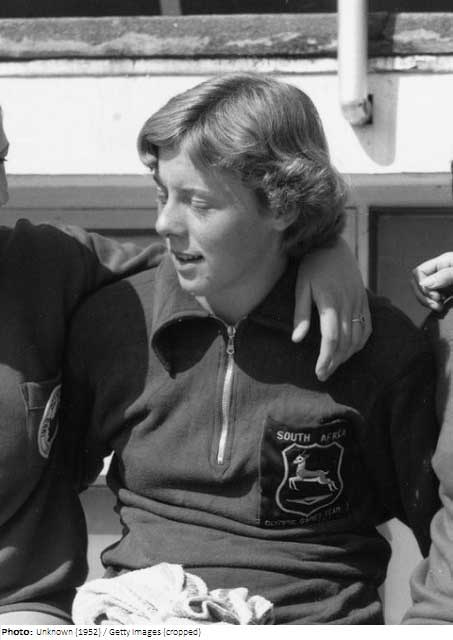
-

Picture 7
-

Picture 10
-

Picture 11
-

Picture 19
-
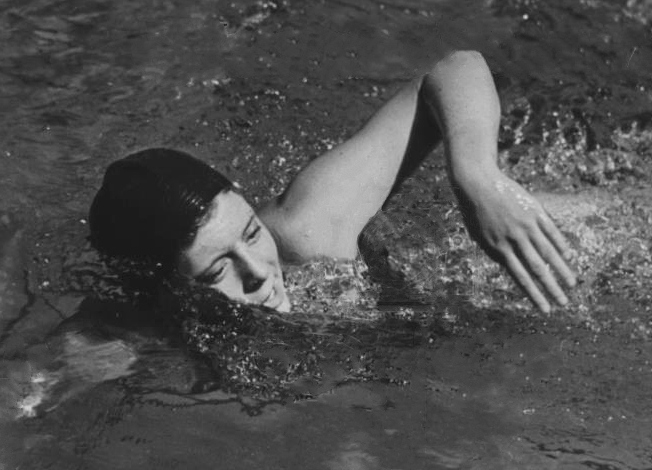
-

-
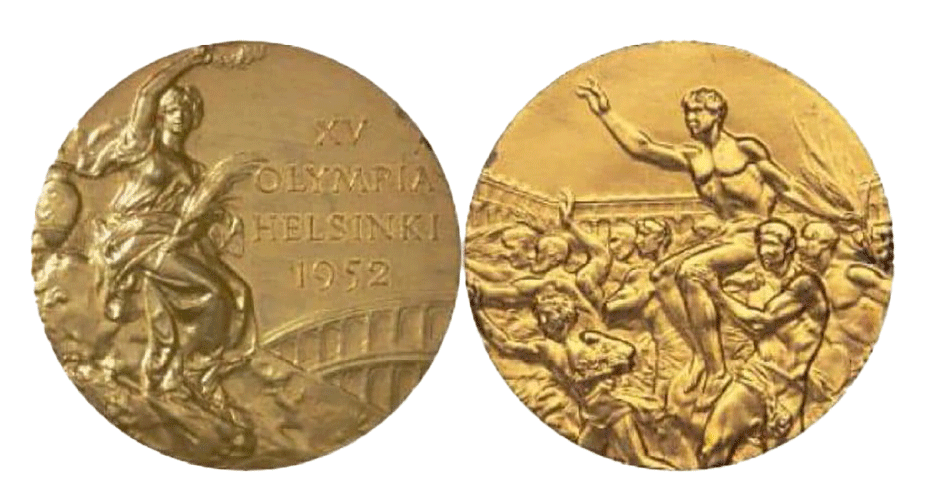
-

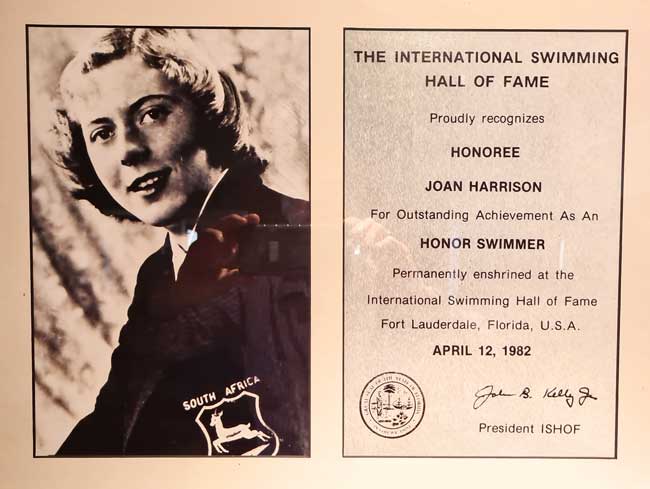
Joan Harrison (RSA)
Honor Swimmer (1982)
The information on this page was written the year of their induction.
FOR THE RECORD: OLYMPIC GAMES: 1952 gold (100m backstroke); COMMONWEALTH GAMES: 1950 gold (400m freestyle), bronze (100m freestyle); 1954 gold (100m backstroke; relay), silver (relay), bronze (100m freestyle).
Born in 1935 of a swimming mother and a rugby-playing father in East London, South Africa, Joan Harrison wasted little time taking advantage of her sporting heritage. At 13, she already held three Jr. and two Sr. national records, and that year won the 220 and 500 yd. Senior Freestyle National Championships. In 1950, at age 14, she won the 440 yd. freestyle at the Commonwealth Games in Auckland, New Zealand, beating the old record by 13 seconds and finishing 7 seconds ahead of the field. It was her first international competition and she was declared the outstanding woman swimmer in the Games. Her second International Games was the Helsinki Olympics in 1952, where she won South Africa’s first and only Olympic gold medal for swimming. In 1954, at the Commonwealth Games in Vancouver, she won two gold medals, a silver, and a bronze before retiring at the ripe old age of 17. She won the Helms Foundation Award for the best African athletic performance in any sport in 1952, and while concentrating on field hockey after 1954, she did manage to come back two more years to win the Nationals in her favorite 100 meter backstroke and in the 300 I. M. in 1956. She was South Africa’s supreme swimmer in freestyle, backstroke and I.M. for six years.
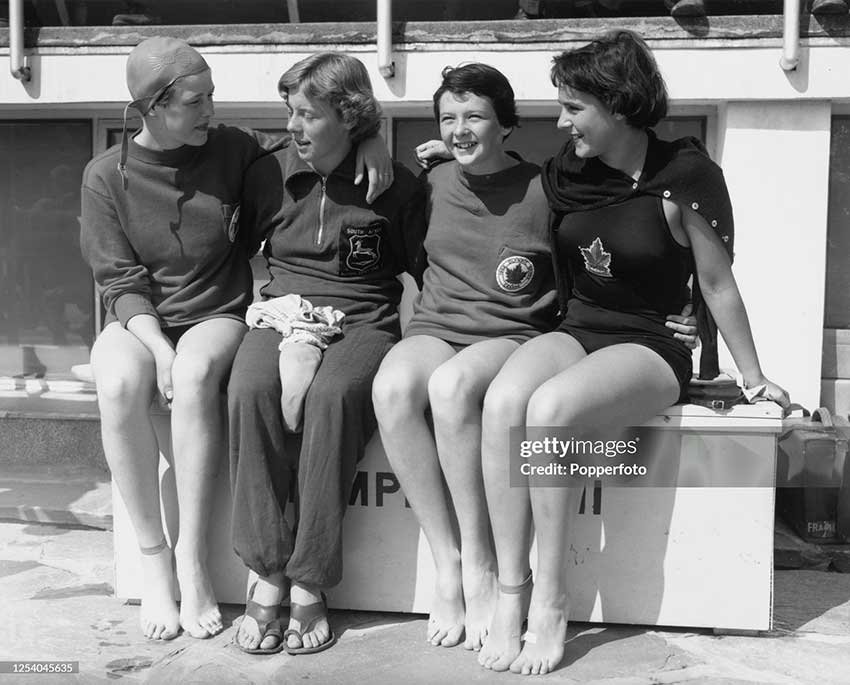
Canadian swimmer Lenora Fisher, South African swimmer Joan Harrison, Canadian swimmer Gladys Priestley, and Canadian swimmer Kay McNamee, take a break during a training session at the Helsinki Swimming Stadium, during the 1952 Summer Olympics in Helsinki, Finland, 18th July 1952. (Photo by Popperfoto/Hulton Archive/Getty Images)
